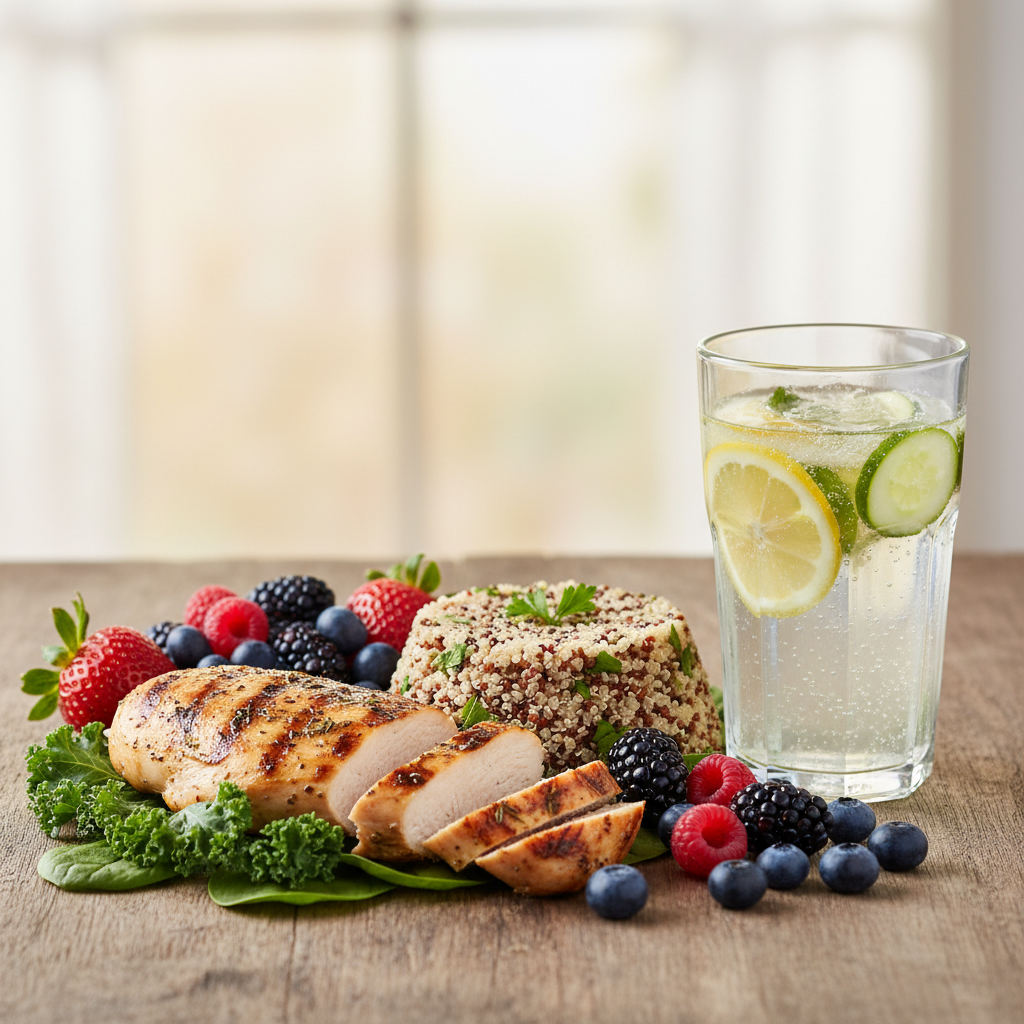
Table of Contents
Introduction
Ever finish a tough workout feeling like you’ve been hit by a truck? You’re not alone. That post-exercise exhaustion is real, and what you eat afterward can make or break how quickly you bounce back. Whether you’re crushing it at the gym five days a week or just trying to stay consistent with weekend workouts, the right recovery foods can be a total game-changer for your fitness journey.
Here’s what happens when you exercise: your body takes a beating (in the best way possible). Muscles break down, energy stores get wiped out, and your system is basically screaming for help. The good news? The right foods can step in like a superhero team—repairing muscle damage, restoring energy, and kicking soreness to the curb. When you understand how macronutrients, hydration, and timing work together, you can turn your recovery game from amateur hour to pro level. This ties directly into effective fitness tips for weight loss and smart nutrition strategies that actually work.
Recovery isn’t just about what you eat, though. It connects to everything else you’re doing—like those fitness challenges for beginners or figuring out how to start a fitness routine that sticks. Think of it as building a complete wellness foundation where every piece supports the others. And let’s not forget hydration—because even the best post-workout meal won’t save you if you’re running on empty when it comes to fluids and electrolytes.
Now, if you’re serious about taking your nutrition to the next level, nutrition for athletes dives deep into strategies that can completely transform how your body handles physical stress. Don’t think you need to eat meat to get quality protein, either. Plant based protein sources offer incredible nutrients and antioxidants that can supercharge your recovery. Speaking of antioxidants, they’re like tiny repair crews for your muscles—check out foods rich in antioxidants to see which ones deserve a spot on your plate.
What You’ll Learn in This Guide
Consider this your no-nonsense roadmap to post-workout nutrition mastery. We’re covering everything from muscle repair basics to meal timing secrets that actually make a difference.
- Understanding the Basics of Recovery Nutrition: Why your post-workout meal matters so much and exactly what nutrients your body is craving after you’ve pushed it to the limit.
- Top Recovery Foods to Include: The powerhouse proteins, energy-boosting carbs, and hydrating foods that’ll have you feeling like new in record time.
- The Importance of Meal Timing: That magical recovery window everyone talks about—and how to use it to your advantage.
- Practical Tips to Boost Your Nutrition: Real-world advice on meal prep, staying hydrated, and whether supplements are worth your money.
Throughout this guide, we’ll explore how proteins become your muscle’s best friend, why carbs aren’t the enemy (despite what some diets claim), and which antioxidant-rich foods fight inflammation like champions. You’ll also discover the truth about meal timing—because yes, when you eat matters, but it’s probably not as complicated as you think. For those days when your muscles feel tight and cranky, we’ll connect proper nutrition with other recovery essentials like best post-workout stretches for a complete recovery approach.
What makes this guide different? We’re skipping the complicated science jargon and focusing on practical, science-backed advice you can actually use. No exotic superfoods that cost a fortune or meal plans that require a personal chef. Just real food choices that fit into real life, paired with strategies that support your bigger fitness goals—whether that’s building strength, improving endurance, or simply feeling awesome in your own skin.
Ready to transform how you think about post-workout nutrition? Let’s dive in and discover how the right foods can help you recover faster, train smarter, and crush your health and fitness goals like never before.

So you know post-workout nutrition matters—but here’s where things get really interesting. What you eat after exercise doesn’t just refuel your body; it literally determines how quickly you bounce back and how much stronger you get from each workout. We’re talking about the difference between feeling like you got hit by a truck tomorrow or walking into your next session ready to crush it.
The Importance of Post-Exercise Recovery Nutrition
Here’s what’s happening in your body right now: your muscles are essentially tiny construction sites with microscopic damage that needs repair. Your energy tanks are running on empty. And your body is sitting there waiting for the right building materials to start the rebuilding process.
Think of it this way—you wouldn’t expect a construction crew to rebuild your house without proper materials, right? Same deal with your muscles. They need protein to patch up those microtears and carbs to refill your energy stores. Skip this step, and you’re basically telling your body to figure it out on its own. (Spoiler alert: it doesn’t go well.)
But there’s more to the story. Your workout also triggered inflammation and oxidative stress—kind of like your body’s internal fire alarm going off. The right recovery foods don’t just rebuild; they calm things down with antioxidants and healthy fats. Plus, they help with hydration, which is crucial for getting nutrients where they need to go. If you’re serious about your fitness goals, this stuff isn’t optional—it’s fundamental. You can get more detailed guidance on specific food choices in our guide about post workout recovery foods for muscle repair and energy, which breaks down exactly which nutrients do what.
Key Benefits of Proper Recovery Foods
Let’s get specific about what proper recovery nutrition actually does for you:
- Muscle Repair and Growth: Protein delivers the amino acids your muscles desperately need to rebuild stronger. Think bigger gains, fewer injuries, and actually getting results from all that hard work.
- Replenishment of Energy Stores: Carbs refill your glycogen tanks—basically your muscles’ gas tank. Without this, your next workout feels like you’re running on fumes.
- Reduction of Muscle Soreness: Anti-inflammatory foods and proper hydration help dial down that “I can barely walk down stairs” feeling. Your future self will thank you.
- Improved Hydration: Electrolyte balance keeps your muscles firing properly and prevents those nasty cramps that can derail a great workout.
Bottom line? The right nutrients after exercise can completely transform how you feel and perform. It’s like having a recovery superpower.
Now that you understand why this matters so much, let’s talk about the actual foods that deliver these game-changing benefits.
Top Foods to Maximize Recovery After Exercise
Okay, let’s get practical. You need foods that work as hard as you do—ones that deliver the right mix of protein, carbs, and recovery-boosting nutrients without a bunch of processed junk your body doesn’t need.
The goal here is simple: give your body exactly what it’s asking for. Protein for those muscle repairs, carbs to refuel your energy stores, and hydrating, anti-inflammatory foods to support everything else. Real food beats supplements every single time. (Your wallet will thank you too.) If you want to dig deeper into how protein specifically supports athletic performance, check out our comprehensive guide on Nutrition for Athletes: Optimizing Performance Through Diet—it’s packed with insights about different protein sources and how they impact recovery.
Key Foods for Recovery
Here are the recovery all-stars that should be on your radar:
- High-Quality Protein Sources: Lean meats like chicken and turkey are classics for a reason—they’re protein powerhouses. Fish like salmon and tuna bring protein plus omega-3s. Plant-based? Beans and lentils have you covered. And don’t sleep on Greek yogurt—protein, probiotics, and calcium all in one.
- Complex Carbohydrates: Brown rice and oats give you steady energy that lasts. Bananas and berries are perfect for quick fuel plus antioxidants (berries are basically nature’s anti-inflammatory medicine). Sweet potatoes? Pure glycogen-refilling gold.
- Hydrating and Electrolyte-Rich Foods: Water is non-negotiable, but coconut water takes it up a notch with natural electrolytes. Leafy greens might sound boring, but they’re hydration heroes that also fight inflammation.
- Healthy Fats and Anti-Inflammatory Options: Chia seeds and fatty fish bring those inflammation-fighting omega-3s. Nuts and seeds pack healthy fats, vitamin E, and extra protein—basically a recovery triple threat.
Mix and match these foods, and you’re setting yourself up for faster recovery, less fatigue, and stronger performance next time around.
But here’s the thing—what you eat is only half the equation. When you eat it? That’s where the magic really happens.
Optimal Timing for Post-Workout Nutrition
Ever heard of the “golden hour”? In recovery nutrition, it’s more like the “golden 30-60 minutes.” This is when your muscles are like sponges, ready to soak up every nutrient you throw at them. Miss this window, and you’re basically leaving gains on the table.
The secret is being prepared. Have a plan before you even start your workout. Protein smoothie with fruit? Perfect. Greek yogurt with berries? Excellent choice. A balanced meal with lean protein and whole grains? Chef’s kiss. The key is having these options ready to go because nobody wants to spend 20 minutes figuring out what to eat when they’re already past the optimal window. For more context on how recovery nutrition fits into endurance training specifically, our guide on how to build cardio endurance offers some great insights about timing strategies.
Key Timing Strategies
Here’s how to nail the timing game:
- Consume Recovery Foods Within 30-60 Minutes: This is your sweet spot—when your muscles are most hungry for nutrients and glycogen synthesis is running at full speed.
- Prepare Convenient Meals or Snacks: Smoothies, protein bars, or pre-made shakes eliminate the guesswork. Prep is everything when you’re tired and hungry.
- Maintain Hydration Immediately Post-Exercise: Start replacing those fluids right away. Your body is basically a plant that just worked out—it needs water to function properly.
- Adjust Intake Based on Exercise Intensity: Crushed a particularly brutal session? Your body needs more fuel to recover. Scale your post-workout nutrition to match your effort level.
Master these timing strategies, and you’ll unlock the full potential of every single workout. Your consistency will improve, your results will accelerate, and you’ll actually start looking forward to recovery instead of dreading how sore you’ll be tomorrow.

Here’s the bottom line: what you do after your workout matters just as much as the workout itself. Maybe even more. Your body is basically screaming for the right nutrients within that 30 to 60-minute window post-exercise, and if you listen? That’s when the magic happens. We’re talking high-quality proteins, complex carbs, and foods that fight inflammation—your muscles will thank you later. Think lean meats, fish, plant-based proteins, whole grains, colorful fruits, and those omega-3 powerhouses. It’s not rocket science, but it works.
And let’s talk hydration for a second. (Because honestly, this gets overlooked way too often.) Your muscles need those electrolyte-rich fluids to transport nutrients and prevent those annoying cramps that can derail your next session. Recovery isn’t just about cramming the right foods into your mouth—though that’s important. It’s about timing, consistency, and actually supporting what your body is trying to do. Stick with these habits? You’ll notice less soreness, better endurance, and results that actually last.
Ready to put this into action? If you’re just starting out, check out these fitness challenges for beginners that’ll help you build strength without overwhelming yourself. New to the whole exercise thing? Our guide on how to start a fitness routine breaks down exactly how to set goals that actually stick. Looking to lose weight while you’re at it? These fitness tips for weight loss will help you dial in both your workouts and recovery nutrition for real, sustainable results. And if you want to dive deeper into the nutrition side of things, this guide on nutrition for athletes shows you exactly how food can transform your training and recovery game.
Look, getting your post-workout nutrition right doesn’t have to be complicated. But when you combine smart recovery meals with a solid fitness routine? That’s when you start training smarter, not just harder. Your future self—the one who feels stronger, recovers faster, and actually enjoys working out—will thank you for the choices you make today. So go ahead, fuel up right and watch what happens.
Frequently Asked Questions
-
What are the best foods to eat immediately after exercise?
- High-protein foods combined with carbohydrates such as a protein smoothie with fruit or yogurt with berries are ideal.
-
How soon after exercise should I eat to aid recovery?
- Aim to consume recovery foods within 30 to 60 minutes post-exercise for optimal benefits.
-
Can hydration really affect muscle recovery?
- Yes, staying hydrated helps prevent muscle cramps and aids nutrient transport for recovery.
